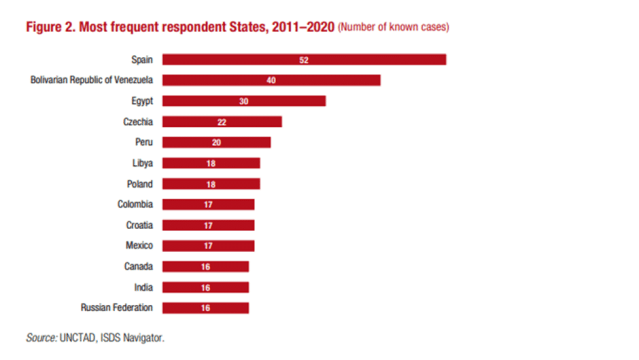Source:
https://expose-news.com/2023/01/06/isds-the-secret-tool-to-undermine-national-sovereignty/
DISCLAIMER
THIS ARTICLE IS FROM A SCIENCE FICTION BOOK PUBLISHED A CENTURY AGO
The latent multinational corporate state technocracy has gifted itself a secret tool, little discussed in electoral politics: the Investor-State Dispute Settlement (“ISDS”).
With its wonky, innocuous-sounding name, the ISDS framework for governing trade disputes is designed to garner as little interest, and therefore as little pushback, as possible from the public.
ISDS is defined by Thomson Reuters as:
In non-academic, practical language, nation-states such as the US no longer exercise ultimate authority over the economic goings-on within their own borders. In theory, foreign actors, normally well-endowed corporations, can sue the US government if it doesn’t satisfy their economic interests. In reality, the US government is sufficiently captured that it would never likely challenge the multinational corporations that wrote the ISDS into legislation themselves through the politicians they purchased. The ISDS is merely extra assurance of compliance, in case a true nationalist ever seized power.
Globalisation – the disintegration of economic borders – drove the development of ISDS. So-called “free trade” agreements like NAFTA and GATT instantiated the concept into law. As academic Magdalena Bas explains:
If a state has no say in how business gets done in its territories, it’s not a state. It’s a proxy for a larger power.
As far as I can suss out, there are two main reasons that most voters have never heard of the ISDS, much less thought about its implications for their lives:
- it’s boring technical stuff; citizens are conditioned to get emotionally worked up about tribal culture war issues instead of focusing on the historic robbery underway by the parasitic elite class, and
- it’s great for multinational corporations that actually run US policy (the aforementioned parasitic elites).
Incrementally, methodically, and ruthlessly, the multinational corporate state, headed by the World Economic Forum, coalesces in the shadows. Once it’s fully completed, backed by legal constructs like ISDS and buttressed by the budding technetronic police state, resistance will be virtually impossible.
The above has been adapted from an article published by Global Research
The World Bank’s International Settlement for Investor Disputes (“ICSID”) governs most of the ISDS cases. Public Citizen noted that this means multinational corporations can sue governments before a panel of three corporate lawyers. These lawyers can award the corporations unlimited sums to be paid by taxpayers, including for the loss of expected future profits, on claims that a nation’s policy violates their rights. Their decisions cannot be appealed. Writing from an American perspective, the Public Citizen continued:
Corporations from Which Countries are Suing Which Countries
It is not only the US that should be concerned about ISDS. In fact, citizens of other countries, particularly in the poorer nations, have just as much to be concerned about.
The United Nations Conference on Trade and Development (“UNCTAD”) produces annual reports on the “facts and figures” of publicly known ISDS cases. Unfortunately, the reports give an overview of the number of cases only and give no indication of the monetary value of the claims. ICSID lists cases in an online database which shows more details on individual cases but, again, no monetary value.
According to UNCTAD’s report published in September 2021, during 2020, investors initiated 68 cases against 43 countries. Peru and Croatia had the highest number of cases brought against them, with six and four cases respectively. “As in previous years, the majority of new cases (about 75 per cent) were brought against developing countries and transition economies,” the report stated. Adding that:

The report also noted the home States of the investors or corporations making the claims. Of the cases in 2020, 70% were made by investors from developed countries:

The UNCTAD’s latest report published in July 2022 related to cases initiated during 2021. Investors brought 68 ISDS cases against 42 countries. Peru again had the largest number, with six, followed by Egypt and Ukraine with four cases each. Following the trend of previous years, about 65% of new cases were brought against developing countries. And, 75% were initiated by investors from developed countries – the highest numbers of cases were brought by claimants from the United States (10 cases).
It’s no wonder that some countries are challenging this outrageous system. Public Citizen noted that South Africa, Indonesia, India and Ecuador are terminating or renegotiating their treaties with ISDS provisions. Venezuela and Bolivia have already done so.
Climate Change ISDS Cases
While the ISDS scheme undermines national sovereignty and nations should put an end this corporate power grab, there is perhaps a flicker of a silver lining in the interim. Perhaps ISDS could become an Achilles’ heel for the climate change/net zero zealots – although it could go the other way and be used as a stick to beat countries into submission, depending which investment treaty the corporation used when they invested in a country.
In a February 2022 article, international law firm Jones Day noted that in recent years investors have started to challenge States’ climate-related actions before ISDS tribunals. According to one tracker, there are currently at least 13 pending climate change-related disputes brought by investors against States.
Among these challenges are claims for compensation following the introduction of climate-related measures diminishing the value of investments. But, on the flip side, investors have also sued States for amending or rolling back climate-related measures, notably in the case of changes to incentive programs introduced by European governments to encourage investment in renewable energy.
Jones Day concluded that ISDS is likely to be an increasingly important avenue for the resolution of climate change disputes.

No comments:
Post a Comment
Note: only a member of this blog may post a comment.